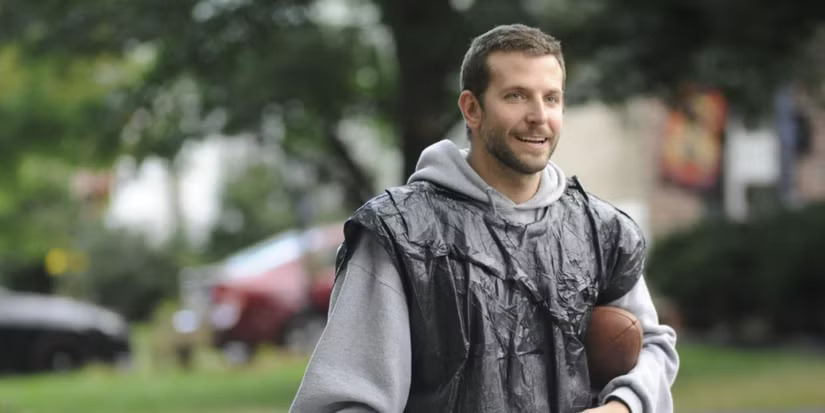Mental health is often misunderstood, and Hollywood hasn’t always helped. Too many films lean into stereotypes—depicting people with mental illness as violent, unstable, or tragic caricatures. Yet, some movies about mental illness break through this noise, offering nuanced portrayals that shed light on real struggles without reducing characters to their diagnoses. These films show mental health in all its complexity—messy, painful, but also deeply human.
Silver Linings Playbook (2012)
This romantic dramedy dives into bipolar disorder through the life of Pat Solitano (Bradley Cooper). Recently released from a psychiatric facility, Pat’s attempt to rebuild his life intertwines with Tiffany (Jennifer Lawrence), a widow battling her own grief. Their dance practices become therapy in disguise, highlighting the messy yet hopeful path toward healing. Among movies about mental illness, this one stands out for showing bipolar disorder with emotional realism—his highs, lows, and resistance to medication mirror real-life struggles.
Rain Man (1988)
Barry Levinson’s classic introduced autism to mainstream audiences through Raymond (Dustin Hoffman), an autistic savant, and his brother Charlie (Tom Cruise). While some aspects simplify autism, the film was groundbreaking in humanizing Raymond. His struggles with routine, social interaction, and sensory overload are balanced by his capacity for love and connection. As one of the earliest movies about mental illness to reach mass audiences, it helped reduce stigma and encouraged empathy.
Girl, Interrupted (1999)
Based on Susanna Kaysen’s memoir, this drama explores life in a psychiatric hospital in the 1960s. Winona Ryder’s Susanna struggles with identity and suicidal ideation, while Angelina Jolie’s Lisa embodies a raw, unpredictable edge of sociopathy. Unlike many movies about mental illness that sensationalize disorders, this film emphasizes humanity, trauma, and the messy reality of treatment.
A Star is Born (2018)
Beyond the music and romance, Bradley Cooper’s film is an unflinching look at addiction, depression, and fame’s toll. Jackson Maine (Cooper) spirals through alcoholism and unresolved trauma while supporting Ally (Lady Gaga). The film’s heartbreaking ending forces viewers to confront how untreated mental health struggles can devastate lives. As a modern entry in movies about mental illness, it explores the link between substance abuse and emotional pain.
It’s Kind of a Funny Story (2010)
Teen mental health rarely gets honest screen time, but this dramedy tackles depression head-on. Craig (Keir Gilchrist), overwhelmed by school and suicidal thoughts, checks into a hospital where he meets others struggling in silence. Humor balances darkness, and the film avoids clichés, showing recovery as a lifelong journey. Unlike other movies about mental illness that trivialize teen struggles, this one normalizes reaching out for help.
What’s Eating Gilbert Grape (1993)
This emotional drama explores family responsibility, disability, and depression. Gilbert (Johnny Depp) cares for his intellectually disabled brother Arnie (Leonardo DiCaprio) and their depressed, obese mother. The film humanizes both characters, particularly Bonnie, whose obesity stems from grief and isolation. It belongs on any list of movies about mental illness for its compassionate view of mental health and family dynamics.
The Perks of Being a Wallflower (2012)
Stephen Chbosky’s adaptation sensitively portrays trauma, depression, and PTSD in teenagers. Charlie (Logan Lerman) is socially withdrawn until friendships help him open up. Unlike superficial movies about mental illness, this story treats teenage trauma with nuance, highlighting the healing power of supportive relationships.
A Beautiful Mind (2001)
Russell Crowe’s portrayal of mathematician John Nash captures the brilliance and pain of schizophrenia. The film demonstrates how delusions affect careers and families but also shows resilience—Nash learns to coexist with his condition. It remains one of the most acclaimed movies about mental illness for its balance of hardship and hope.
Joker (2019)
Joaquin Phoenix’s Arthur Fleck is a disturbing reminder of how neglect and stigma worsen mental illness. His descent into psychosis and violence forces society to reflect on what happens when vulnerable people are abandoned. Unlike many movies about mental illness, Joker pushes audiences to question their role in perpetuating isolation.
Black Swan (2010)
Natalie Portman’s Nina embodies the dangers of perfectionism, anorexia, paranoia, and OCD. Her unraveling under ballet’s pressure blurs reality and delusion, offering a haunting but powerful exploration of untreated mental health struggles. As one of the most striking movies about mental illness, it reflects the psychological toll of unrealistic expectations.
Frequently Asked Questions (FAQs ) –
Q1: Do films portray mental health accurately?
Not always. Some exaggerate symptoms for drama, but a growing number aim for realism by consulting experts and sharing lived experiences.
Q2: Why are these portrayals important?
Films shape public perception. Accurate portrayals reduce stigma, encourage empathy, and can even inspire viewers to seek help.
Q3: Which conditions are most misrepresented?
Schizophrenia and dissociative identity disorder are often sensationalized as violent, despite most individuals not being dangerous.
Q4: Can watching these movies about mental illness raise awareness?
Yes. While films aren’t medical education, they spark conversations, normalize therapy, and help audiences connect to mental health more personally.
Q5: What should viewers remember?
Movies are storytelling tools. For genuine guidance, always rely on mental health professionals, not Hollywood scripts.







